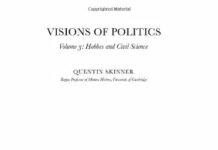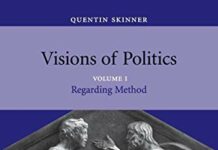
Ebook Info
- Published: 1978
- Number of pages: 414 pages
- Format: PDF
- File Size: 24.33 MB
- Authors: Quentin Skinner
Description
A two-volume study of political thought from the late thirteenth to the end of the sixteenth century, the decisive period of transition from medieval to modern political theory. The work is intended to be both an introduction to the period for students, and a presentation and justification of a particular approach to the interpretation of historical texts. Quentin Skinner gives an outline account of all the principal texts of the period, discussing in turn the chief political writings of Dante, Marsiglio, Bartolus, Machiavelli, Erasmus and more, Luther and Calvin, Bodin and the Calvinist revolutionaries. But he also examines a very large number of lesser writers in order to explain the general social and intellectual context in which these leading theorists worked. He thus presents the history not as a procession of ‘classic texts’ but are more readily intelligible. He traces by this means the gradual emergence of the vocabulary of modern political thought, and in particular the crucial concept of the State. We are given an insight into the actual processes of the formation of ideologies and into some of the linkages between political theory and practice. Professor Skinner has been awarded the Balzan Prize Life Time Achievement Award for Political Thought, History and Theory. Full details of this award can be found at http://www.balzan.it/News_eng.aspx?ID=2474
User’s Reviews
Reviews from Amazon users which were colected at the time this book was published on the website:
⭐A brilliant work. His short introductory book on Machiavelli was also very good.
⭐Very helpful
⭐First published in 1978 and reprinted in paper in 1980, this study is a brilliant synthesis of political thought in the Renaissance and Reformation, two crucial periods in the development of modern Europe. Skinner was at the time (and still is) professor of political science at the University of Cambridge. His areas of published work have been the Italian Renaissance and thought and the growth of the state through the Reformation period and political theory of the same era. He recently published a relatively new work, Hobbes and Republican Liberty (Cambridge, 2008)- a good study of an aspect of Hobbesian political thought. The book under review is one of the best overall surveys of political thought in the Renaissance and Reformation periods that a student can find. My only suggestion is that it should be supplemented by newer works, and Burns, J.H., ed. The Cambridge History of Political Thought, 1450-1700, (Cambridge, 1991) would be a good supplement. William J. Bouwsma, The Waning of the Renaissance ( Yale University Press, 2000) and Jardine, Lisa. Wordly Goods: A New History of the Renaissance (New York: Norton, 2000) offer important surveys of the period that can also be read along with Skinner. The Gaukroger volumes mentioned below are excellent works to read for more recent surveys. But they are not easy reads-fun however!Skinner divides his work into two volumes, the first covering the Renaissance, the second the Reformation. One of the things that makes these volumes so special is the clarity with which the ideas of the period are presented. Skinner discusses the background of Scholasticism, the rise of the concept of liberty in the Italian states, and the development humanism and other ideas that would be important in challenging many of the ideas of the State that were current at the time. Much of his discussion is explication of texts. A second important part of what Skinner highlights is how Humanism and its concerns began to transform the educational curriculum of the times, and how new knowledge, particularly concerning science or of other cultures was gradually allowed into the educational model. For science in particular this is a period that is very important and many of the conclusions are now being modified in light of new evidence. Skinner intelligently discusses Machiavelli, and his political classic, the Prince. For science in particular, there is a new book that I recommend: Westman, Robert S. The Copernican Question: Prognostication, Skepticism, and the Celestial Order. Berkeley: University of California Press, 2011. This work is outstanding on the rise of Copernican theory in the Renaissance.The Florentine Renaissance, that flowering of intellect, talent and political power is seen as a crossroads, and Skinner points out the manner in which the writings of the time argued against the prevailing assumptions concerning Man and his place in the world. This is part of what is now known as the Humanist rebellion- a view that is traced in thinkers such as Petrarch and Pico della Mirandola. A last, and very important change, occurred in the realm of history-where much of the medieval outlook on history-which had been that history was linear aiming towards a predetermined end-was gradually jettisoned. The old classical view-that history ran in cycles-began to recover favor. This was part and parcel of the overall recovery of antiquity-through manuscripts, texts, and languages that was also part of what we know as the Renaissance. Most of the first volume is devoted to a thorough discussion of the intellectual foundations of Humanism and it’s diffusion, a crucial component of the Western heritage. I think the reader should supplement his reading at this point- if just to be a little more up to date. An older work by Weiss, Roberto. The Renaissance Discovery of Classical Antiquity. (Oxford: Basil Blackwell, 1969) is a classic and very important for this period of a truly important subject.The second volume is devoted almost exclusively to the Reformation. The specific focus is the political context of Lutheranism-what it’s forerunners were, what were the immediate and long-term consequences, and how the Papacy reacted to the fight over church authority. An excellent chapter is devoted to the role of the secular authorities in spreading and protecting the new religion- making it possible to survive in the beginning. The last chapters cover some very complex topics- the beginnings of the Huguenot Rebellion, political aftershocks of Lutheranism and especially the rise of Calvinism and political theory behind the duty to resist. Skinner is one of the those historians who can write intelligently about religion and sympathize with each perspective or group. Other issues are also discussed-the revival of Thomism- but inevitably the Reformation drama takes central stage. The reader should probably also consult a good general history of the Reformation such as Evans, G.R. The Roots of the Reformation: Tradition, Emergence, and Rupture. (Intervarsity Academic, 2012) or Kaplan, Benjamin. Divide by Faith: Religious Conflict and Practice in Early Modern Europe. (Harvard: Harvard University Press, 2007). There are new works now coming out on the French Church and the Huguenots that have benefited from the opening of archives and the general interest in this area again that will alter our perspectives on the Wars of Religion.Both of the Skinner works can be read individually, or back to back with profit. Skinner writes very well, and fleshes out his ideas fully. I don’t know of any current synthesis by one writer of this quality. As other reviewers have said, they are a pleasure to read.I’m going to amend this review a little to include 3 new volumes by Stephen Gaukroger (of a planned 5) that started appearing in 2006 (so they really can’t be called ‘new’-except for the last one) that are just outstanding. They are: The Emergence of a Scientific Culture: Science and the Shaping of Modernity, 1210-1685; (Oxford, 2006) vol. 2: The Collapse of Mechanism and the Rise of Sensibility, 1680-1760; (Oxford, 2010) and vol. 3. The Natural and the Human: Science and the Shaping of Modernity, 1739-1841. (Oxford, 2016). They are essentially a history of philosophic thought focused upon the rise of science and I think supplement Skinner. They cover or touch on many of the themes that Skinner does and many new ones.
⭐Classic
⭐流石ケンブリッジ大学の欽定教授だと思いました。高校生時代に世界史で習った「ルネサンス」ってちょいと彼の視点からすると違ったaspectsを見せてくれるではありませんか。人間復興とか、キリスト教からの脱却とか教わりましたが、違うじゃあありませんか。目から鱗の1&2巻でありました。内容についてスキナー教授にメイルしたところ、大変丁寧にこちらの考え違いを指摘してくださいました。もう八百年近く前のイタリア中心の話で(実際には13世紀から16世紀ぐらいまでを網羅)人間の生き方(哲学)から勿論美術・建築・文学にまで多岐に渡り述べられていて、現代人の私の有様がなんだか薄っぺらの影の様な気分になるくらい、あの時代の人間の生き方が迫力満点で迫って来ました。私たちって何に向かって何をしているんだろう?小林秀雄ではないけれど、『常なるものを失った』現代人、必読です。terrible shape
Keywords
Free Download The Foundations of Modern Political Thought: Volume 2, The Age of Reformation in PDF format
The Foundations of Modern Political Thought: Volume 2, The Age of Reformation PDF Free Download
Download The Foundations of Modern Political Thought: Volume 2, The Age of Reformation 1978 PDF Free
The Foundations of Modern Political Thought: Volume 2, The Age of Reformation 1978 PDF Free Download
Download The Foundations of Modern Political Thought: Volume 2, The Age of Reformation PDF
Free Download Ebook The Foundations of Modern Political Thought: Volume 2, The Age of Reformation




